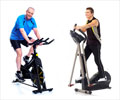Australian public health experts are calling for better cycling infrastructure, traffic calming and more harmonious relationships between all road users.
Cycle your way to health better health. That is a well-known slogan these days. But is there enough support system in place?
Australian public health experts are calling for better cycling infrastructure, traffic calming and more harmonious relationships between all road users to further increase cycling as a clean, green and healthy mode of transport.Dr Jan Garrard, a senior lecturer with Deakin’s School of Health and Social Development, has completed the largest and most comprehensive study of the motivations, supports and constraints on cycling conducted in Australia. The results point to a need for a multi-pronged approach to support and encourage cycling.
“The study highlighted a range of issues that impact on the experiences of cyclists. Until these issues are properly addressed we won’t achieve the high cycling rates that other countries have achieved,” Dr Garrard said.
“The benefits of cycling are well documented and have been highlighted as a means of addressing health issues, climate change and traffic congestion. However, in Australia there are still a number of barriers to making cycling an appealing mode of transport for many people.”
The study was conducted by Dr Garrard and a research team from Deakin’s School of Health and Social Development with support from Sport and Recreation Victoria, the Cycling Promotion Fund and Bicycle Victoria. It included an on-line survey of 2403 men and women drawn from Bicycle Victoria’s database of members and contacts, as well as interviews and focus group discussions. It specifically looked at the gender differences in cycling behaviour and experiences.
“Female participation in cycling appears to be an indicator of a cycling friendly culture and environment,” Dr Garrard said.
Results of the study showed that 91 per cent of the study participants cycled for recreation, followed by 58 per cent for transport and 13 per cent for competition. Cycling for transport and recreation was the most common combination.
Road safety concerns and driver behaviour were more of an issue for women than men. Confidence in bike maintenance, cycling ability and cycling skills were also more of a concern for women.
The five most important constraints on cycling were lack of time, concerns about cycling in traffic, aggression from motorists, bad weather and inhaling car fumes, Dr Garrard said.
Only recently another Australian study urged more cycling. People with diabetes often encounter major health problems with their lower limbs due to a lack of sensation, reduced circulation, and increased pressure through the feet. This can lead to ulcers and other complications, said senior lecturer in human movement at University of South Australia’s School of Health Sciences, Dr Annette Raynor.
“The aim of our study was to determine if a cycling program would improve the sensation and blood flow through the feet, and produce lower levels of pressure than the exercise mode that is normally prescribed for these individuals, namely walking,” Dr Raynor said.
At the end of the study, Rebecca Nolan, who conducted the tests, reported significant reduction in pressure through the participants’ feet.
“While the results revealed no significant changes with respect to the vibration and sensation levels on the soles of their feet, most of the women experienced some improvement in those measures, and no one experienced increased pressure. These are important findings given the association between increased pressure and the development of ulcers,” she noted.
Source-Medindia
GPL/P
 MEDINDIA
MEDINDIA
 Email
Email








